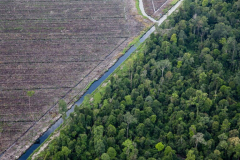- The world’s biggest sustainable timber certifier has updated how it applies its “corporate group” rules, which determine whether certified companies are held responsible for violations by affiliates, suppliers or subsidiaries.
- NGOs like Forest Peoples Programme, Greenpeace and Rainforest Action Network warn the change could let forestry giants such as APP and APRIL rejoin the FSC without fully remedying past deforestation and land conflicts.
- The NGOs took part in the review process, but say it favored corporate voices and misrepresented civil society input, raising concerns that the update prioritizes company reputations over community rights.
- Critics say narrowing the corporate group scope risks shielding parts of conglomerates from scrutiny just as the FSC tests its remedy framework with some of the world’s largest forestry companies.
JAKARTA — The world’s largest sustainable timber label is under fire for revising how it applies its rules on corporate accountability — a move activists say could let forestry giants long tied to deforestation and land conflicts rebrand themselves as “green.”
The Forest Stewardship Council (FSC), which certifies wood and paper products worldwide, confirmed to Mongabay that it has revised its internal guidance on the scope of a company’s “corporate group.” The concept is central to the FSC’s rules because it determines how to deal with a company that’s certified if one of its uncertified subsidiaries, suppliers or affiliates is found to have committed forestry violations.
The FSC’s corporate group definition is currently based on the standard of “common control” drawn up by the Accountability Framework Initiative (AFi), a collaborative effort by 25 NGOs to build and scale up ethical supply chains for agricultural and forestry products.
“This work considers the learnings to date on identifying and concluding the scope of the corporate group and builds on the strengths of the [AFi’s] definition,” the FSC said in a statement. “This is not the same as reviewing the definition itself.”
The distinction matters because under the FSC’s Policy for Association and Remedy Framework, an entire corporate group can be held accountable for destructive practices like illegal logging, human rights abuses, or deforestation by any of its members.
Under the remedy framework, firms that have lost their FSC certification, or been “disassociated,” can only return to the FSC fold if they make up for past harms across their corporate group — not just at the single violating mill or plantation.
Two of the world’s largest pulp and paper producers — Asia Pulp & Paper (APP) and APRIL — are currently engaged in the remedy framework in a bid to rejoin the FSC. Both were previously cut off for clearing vast swaths of rainforest in Indonesia and being embroiled in social conflicts with Indigenous and local communities there.
Critics warn that any narrowing of the corporate group scope could allow these conglomerates to leave parts of their networks outside the rules, shielding affiliated entities from scrutiny.
“Given the centrality of the corporate group definition to the remedy process, this creates a real risk that companies could exploit the process to narrow accountability,” said Angus MacInnes, a project officer at the U.K.-based Forest Peoples Programme (FPP). “This would undermine remedies for communities harmed by APRIL, APP, and other major forestry conglomerates.”






